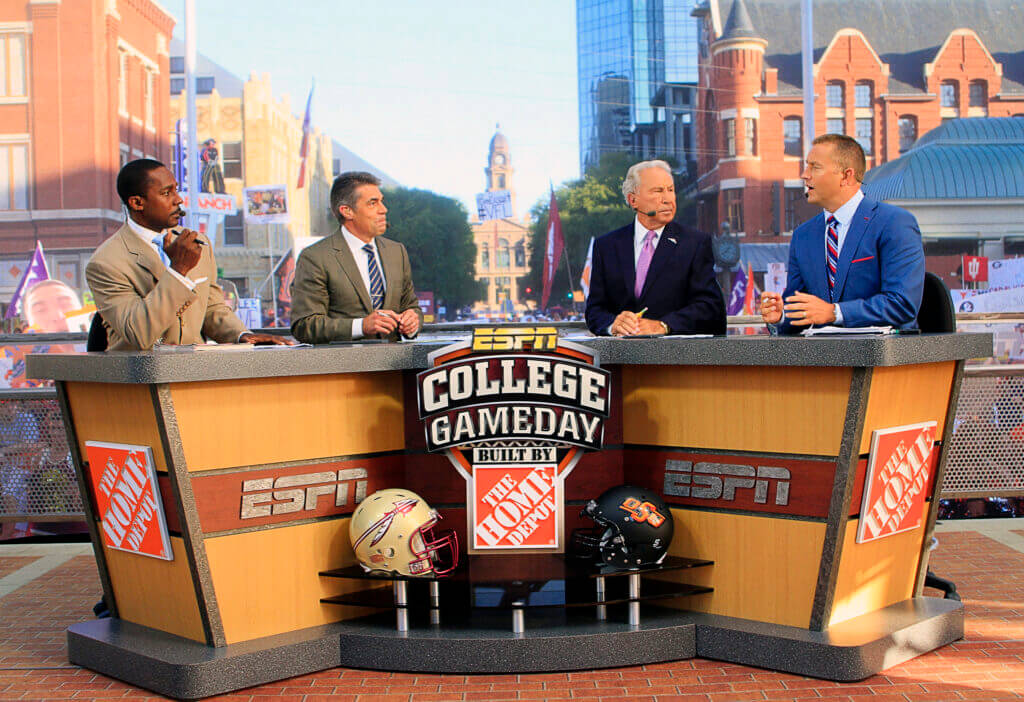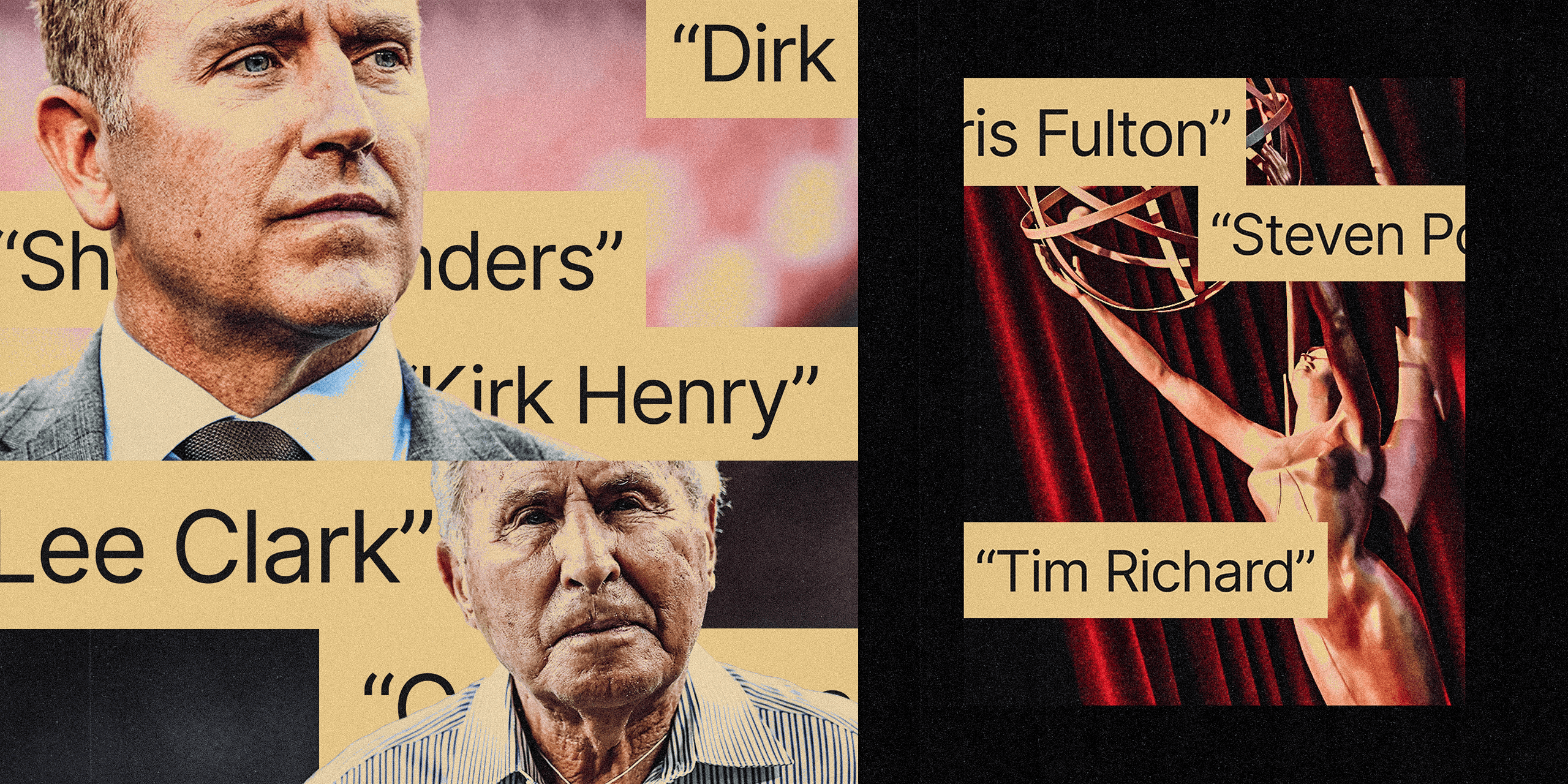In March 2023, Shelley Smith, who worked 26 years as an on-air reporter for ESPN, received a call from Stephanie Druley, then the network’s head of studio and event production. Druley said she wanted to talk about something “serious” that needed to stay between the two of them, Smith recalled. She then told Smith that Smith needed to return two sports Emmy statuettes that she had been given more than a decade earlier.
Advertisement
That request was one of many ESPN made of some of its biggest stars last year after the National Academy of Television Arts & Sciences (NATAS), the organization that administers the Emmys, uncovered a scheme that the network used to acquire more than 30 of the coveted statuettes for on-air talent ineligible to receive them. Since at least 2010, ESPN inserted fake names in Emmy entries, then took the awards won by some of those imaginary individuals, had them re-engraved and gave them to on-air personalities.
Kirk Herbstreit, Lee Corso, Chris Fowler, Desmond Howard and Samantha Ponder, among others, were given the ill-gotten Emmys, according to a source briefed on the matter, who was granted anonymity because the individual is not authorized to discuss it publicly. There is no evidence that the on-air individuals were aware the Emmys given to them were improperly obtained.
“I think it was really crummy what they did to me and others,” said Smith, who worked at ESPN from 1997 until her contract expired last July.
The fraud was discovered by NATAS, which prompted an investigation by that organization and later by ESPN. Those probes resulted in sanctions beyond the return of the trophies. While it is not known who orchestrated the scheme, Craig Lazarus, vice president and executive producer of original content and features, and Lee Fitting, a senior vice president of production who oversaw “College GameDay” and other properties, were among the ESPN employees NATAS ruled ineligible from future participation in the Emmys.
In a statement, ESPN said: “Some members of our team were clearly wrong in submitting certain names that may go back to 1997 in Emmy categories where they were not eligible for recognition or statuettes. This was a misguided attempt to recognize on-air individuals who were important members of our production team. Once current leadership was made aware, we apologized to NATAS for violating guidelines and worked closely with them to completely overhaul our submission process to safeguard against anything like this happening again.
Advertisement
“We brought in outside counsel to conduct a full and thorough investigation and individuals found to be responsible were disciplined by ESPN.”
Adam Sharp, of NATAS, said in an email: “NATAS identified a number of fictitious credits submitted by ESPN to multiple Sports Emmys competitions. When brought to the attention of ESPN senior management, the network took steps to take responsibility for the actions of its personnel, to investigate thoroughly, and to course correct. These steps have included the return by ESPN of statuettes issued to fictitious individuals and commitments to implement further internal accountability and procedural changes at the network.”
An ESPN spokesperson said Lazarus declined to comment, and Lazarus didn’t respond to an email seeking comment. Fitting was let go by ESPN in August after 25 years at the company. He did not respond to voice and text messages.
The nexus of the scheme was “College GameDay,” the show that Fitting helped turn into a cultural phenomenon and a revenue machine. From 2008-18, it nabbed eight Emmys for outstanding weekly studio show. But on-air talent was, until 2023, prohibited by NATAS guidelines from being included in a credit list in that category. Hosts, analysts and reporters on “College GameDay” could win individual awards, such as outstanding host, studio analyst or emerging on-air talent, and they could win for an individual feature. But they were not eligible to take home a trophy for a win by the show. That rule was meant to prevent front-facing talent from winning two awards for the same work (termed “double-dipping” in the NATAS rulebook).

ESPN circumvented the rule by inserting fake names into the credit list it submitted to NATAS for “College GameDay.” The Athletic reviewed the credit lists for the years the show won: 2010, 2011, 2014, 2015, 2016, 2017 and 2018. In each one of those seven years, names similar to the names of on-air personalities – and with identical initials – were listed all under the title of “associate producers.”
Advertisement
Kirk Henry (Kirk Herbstreit), Lee Clark (Lee Corso), Dirk Howard (Desmond Howard), and Tim Richard (Tom Rinaldi) appeared in all seven years. Steven Ponder (Sam Ponder) and Gene Wilson (Gene Wojciechowski) appeared in five from 2014-18. Chris Fulton (Chris Fowler) appeared in 2010, 2011, 2014 and 2015. Shelley Saunders (Shelley Smith) appeared in the 2010 credit list. Smith was also given an Emmy for the show’s win in 2008, though it is unclear how that statuette was obtained; Shelley Saunders was not listed in the 2008 credit list viewed by The Athletic. However, networks are allowed to modify a credit list after a show is announced as a winner.

 theathletic.com
theathletic.com
Advertisement
That request was one of many ESPN made of some of its biggest stars last year after the National Academy of Television Arts & Sciences (NATAS), the organization that administers the Emmys, uncovered a scheme that the network used to acquire more than 30 of the coveted statuettes for on-air talent ineligible to receive them. Since at least 2010, ESPN inserted fake names in Emmy entries, then took the awards won by some of those imaginary individuals, had them re-engraved and gave them to on-air personalities.
Kirk Herbstreit, Lee Corso, Chris Fowler, Desmond Howard and Samantha Ponder, among others, were given the ill-gotten Emmys, according to a source briefed on the matter, who was granted anonymity because the individual is not authorized to discuss it publicly. There is no evidence that the on-air individuals were aware the Emmys given to them were improperly obtained.
“I think it was really crummy what they did to me and others,” said Smith, who worked at ESPN from 1997 until her contract expired last July.
The fraud was discovered by NATAS, which prompted an investigation by that organization and later by ESPN. Those probes resulted in sanctions beyond the return of the trophies. While it is not known who orchestrated the scheme, Craig Lazarus, vice president and executive producer of original content and features, and Lee Fitting, a senior vice president of production who oversaw “College GameDay” and other properties, were among the ESPN employees NATAS ruled ineligible from future participation in the Emmys.
In a statement, ESPN said: “Some members of our team were clearly wrong in submitting certain names that may go back to 1997 in Emmy categories where they were not eligible for recognition or statuettes. This was a misguided attempt to recognize on-air individuals who were important members of our production team. Once current leadership was made aware, we apologized to NATAS for violating guidelines and worked closely with them to completely overhaul our submission process to safeguard against anything like this happening again.
Advertisement
“We brought in outside counsel to conduct a full and thorough investigation and individuals found to be responsible were disciplined by ESPN.”
Adam Sharp, of NATAS, said in an email: “NATAS identified a number of fictitious credits submitted by ESPN to multiple Sports Emmys competitions. When brought to the attention of ESPN senior management, the network took steps to take responsibility for the actions of its personnel, to investigate thoroughly, and to course correct. These steps have included the return by ESPN of statuettes issued to fictitious individuals and commitments to implement further internal accountability and procedural changes at the network.”
An ESPN spokesperson said Lazarus declined to comment, and Lazarus didn’t respond to an email seeking comment. Fitting was let go by ESPN in August after 25 years at the company. He did not respond to voice and text messages.
The nexus of the scheme was “College GameDay,” the show that Fitting helped turn into a cultural phenomenon and a revenue machine. From 2008-18, it nabbed eight Emmys for outstanding weekly studio show. But on-air talent was, until 2023, prohibited by NATAS guidelines from being included in a credit list in that category. Hosts, analysts and reporters on “College GameDay” could win individual awards, such as outstanding host, studio analyst or emerging on-air talent, and they could win for an individual feature. But they were not eligible to take home a trophy for a win by the show. That rule was meant to prevent front-facing talent from winning two awards for the same work (termed “double-dipping” in the NATAS rulebook).

ESPN circumvented the rule by inserting fake names into the credit list it submitted to NATAS for “College GameDay.” The Athletic reviewed the credit lists for the years the show won: 2010, 2011, 2014, 2015, 2016, 2017 and 2018. In each one of those seven years, names similar to the names of on-air personalities – and with identical initials – were listed all under the title of “associate producers.”
Advertisement
Kirk Henry (Kirk Herbstreit), Lee Clark (Lee Corso), Dirk Howard (Desmond Howard), and Tim Richard (Tom Rinaldi) appeared in all seven years. Steven Ponder (Sam Ponder) and Gene Wilson (Gene Wojciechowski) appeared in five from 2014-18. Chris Fulton (Chris Fowler) appeared in 2010, 2011, 2014 and 2015. Shelley Saunders (Shelley Smith) appeared in the 2010 credit list. Smith was also given an Emmy for the show’s win in 2008, though it is unclear how that statuette was obtained; Shelley Saunders was not listed in the 2008 credit list viewed by The Athletic. However, networks are allowed to modify a credit list after a show is announced as a winner.

ESPN used fake names to secure Emmys for 'College GameDay' stars
Kirk Herbstreit, Lee Corso, Chris Fowler, Desmond Howard and Samantha Ponder were among those given the ill-gotten awards.



